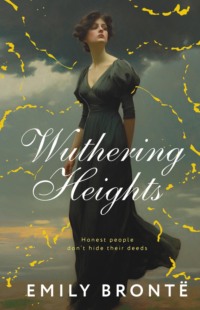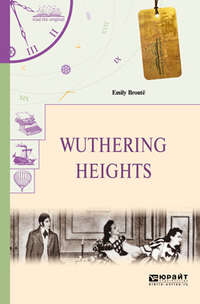
Полная версия
Сборник лучших произведений английской классической литературы. Уровень 3
“'Lowood Institution.-
'Let your light so shine before men, that they may see your good works, and glorify your Father which is in heaven.'-
St. Matt. v. 16.”
I read these words over and over again: there must be an explanation. I was still thinking about the inscription when the sound of a cough close behind me made me turn my head. A girl a few years older than me was sitting on a stone bench, reading a book. I saw that it was called-Rasselas. It sounded exotic and exciting, as if it might be about genies and dragons. I wished I had a book to read myself, and I wondered if the girl might lend it to me one day.
As she turned the page, she looked up and I took my chance to speak.
“Is your book interesting?”
“I like it,” she said.
“What is it about?”
She handed me the book to look at. 'Rasselas' looked boring. There were no pictures, and I saw nothing about fairies, nothing about genii. I returned it, and asked instead:
“Have you seen the inscription? What is Lowood Institution?”
“This house where you are now.”
“Why isn't it called a school?”
“It's partly a charity-school for orphans.”
“Do we pay no money?”
“We pay, or our friends pay, fifteen pounds a year for each. Not enough for board and teaching, and we are also funded by kind-hearted ladies and gentlemen from the neighbourhood and London. And Mr. Brocklehurst overlooks and directs everything here.”
“Then this house does not belong to that tall lady who said we were to have some bread and cheese?”
“Miss Temple? I wish it did! But she has to answer to Mr. Brocklehurst.”
“It is that cruel man who visited Mrs. Reed at Gateshead Hall,” I thought.
“Does he live here?” I asked.
“Oh no, he lives in a big house two miles away, with his family. He's the village clergyman[12].”
I asked her about the teachers. They were all nice and she liked them, but Miss Temple was the best. She was very clever and knew far more than the others did.
“Are you an orphan too?” I asked finally.
“My mother is dead.”
“Are you happy here?”
“You ask too many questions,” but at that moment the bell rang to call us back inside. We had dinner and more classes followed it.
The only marked event of the afternoon was that I saw Miss Scatcherd from a history class scolding my new friend. I could not see what she had done wrong, but she was sent to stand in the middle of the schoolroom, where everyone could stare at her.
If this had happened to me, I knew I would have been overwhelmed with rage and indignation[13]. The punishment seemed to me unfair, and I was amazed to see her standing there quietly, looking at the floor without a hint of distress and shame. I did not understand her though I wanted to.
The school day ended with brown bread and coffee, half-an-hour's recreation, then study, then the glass of water and the piece of oatcake, prayers, and bed.
Such was my first day at Lowood.
Chapter 6
The next day began as before, except that we could not wash as the water in the pitchers was frozen solid. It was now even colder, and a freezing wind blew right into the dormitory. We shivered through our early morning prayers until the breakfast bell. Today, the porridge was not burned, but there still was not enough of it and I stayed hungry again.
Until now I had only watched the lessons; today I was allowed to take part in the fourth class. If I had to struggle with learning things by heart, now I was given a pleasant task to sew, which I could do easily, and I could sit quietly in the corner and spy on the class next to ours.
It was an English history lesson. We were sitting so quietly that we could hear every word-Miss Scatcherd's questions, and each girl's response. I could see the girl I had talked to on the verandah: in fact, Miss Scatcherd seemed to be angry with her constantly.
“Burns,” (the girls here were all called by their surnames). “Burns, I insist on your holding your head up; Or: “Burns, you are standing on the side of your shoe; stop it now!”
The class read the chapter twice and closed the books. Now the girls had to answer the questions. No one but Burns could remember the details well enough to answer. Miss Scatcherd could have praised my friend but instead she suddenly cried: “You dirty, disagreeable girl! you have never cleaned your nails this morning!”
“Why doesn't she tell her that the water was frozen and nobody could do it?” I thought. But Burns was silent.
Just then, Miss Smith came up to me. She asked me whether I could knit, or darn, or stitch and whether I had been to school before. Till she dismissed me, I could not watch the history class.
When I looked back at last, Burns was given an order I could not hear and immediately left the class. She returned with a bundle of long twigs tied together at one end, which she handed to Miss Scatcherd with respectful curtsy. I paused from my sewing. Without being told, she unloosed her pinafore, and the teacher unhesitatingly gave her twelve sharp lashes on the side of her neck. I was overwhelmed by anger, but Burns kept her ordinary expression, which did not escape Miss Scatcherd's attention. “Nothing can correct you!” she exclaimed.
Burns obeyed when she was told to take the rod away. When she returned, she had her handkerchief in hand, and I could see that she had cried a little.
That evening, after our bread and milk, I wandered around the tables. I had decided that this was the best part of the day: we were free to do anything we wanted for a whole hour. I decided to look for Burns and talk to her once again.
I found her sitting by the fireside finishing the same book. I sat down beside her on the floor and, when she had closed the book, I asked: “What is your name besides Burns?”
“Helen.”
“Do you come a long way from here?”
“I come from a place farther north, quite on the borders of Scotland.”
“You must wish you leave Lowood?”
“No! Why should I? I was sent here to get an education, so I should do it before I go.”
“But Miss Scatcherd is so cruel to you.”
“Not at all! She just dislikes my faults.”
“If she struck me with that rod, I would get it from her hand; I would break it under her nose!”
“You probably would not. If you did, Mr. Brocklehurst would expel you from the school. It's better to endure patiently, than to cause problems for all connected with you. The Bible tells us to return good for evil.”
“But she humiliated you! I am far younger than you, and I could not bear it! You say you have faults, Helen: what are they? To me you seem very good.”
“I seldom put, and never keep, things, in order; I am careless; I forget rules; I read when I should learn my lessons. This is all very provoking to Miss Scatcherd, who is naturally neat, punctual, and particular.”
“And cross and cruel,” I added but Helen paid no attention to it.
“Is Miss Temple as severe to you as Miss Scatcherd?” I asked.
A soft smile appeared on Helen's face.
“Miss Temple is full of goodness: she sees my errors, and tells me of them gently, and praises me when I do anything worthy of praise.”
“And how well you replied this afternoon.”
“It was mere chance. But every time when I listen to Miss Scatcherd, I lose the very sound of her voice, I fall into a sort of dream.”
“But Helen; isn't it right to dislike those who, whatever I do to please them, persist in disliking me, to resist those who punish me unjustly, and love those who show kindness to me?”
“No. Love your enemies, do good to those who hate and use you.”
“Then I should love Mrs. Reed?”
Helen Burns asked me to explain and I told her everything about this woman with excitement and anger in my voice.
“She has been unkind to you, no doubt,” was the answer to my story. “But how clearly you remember all she has done and said to you! Life is too short to be spent in nursing hatred or rage. We are all full of faults. That is why I choose to forgive and live in calm.”
Just then, one of the monitors came up to us.
“Helen Burns, if you don't put your drawer in order this minute, I'll tell Miss Scatcherd about it!” Helen sighed and obeyed the monitor without reply.
Chapter 7
My first three months seemed an age. I tried hard to get accustomed to new rules and tasks. The freezing weather stayed during January, February, and part of March. The roads were almost impassable because of deep snow, later because it started to melt.
Sundays were the worst days in that wintry season. We had to walk two miles to Brocklebridge Church. We set out cold, we arrived at church colder. During the morning service we became almost paralysed. We longed for the light and heat of the fireside.
I was always hungry. The portions were very small, and some of the bigger girls also bullied the little ones and took their bread. I had to share with them and left practically nothing for myself.
In my first weeks at Lowood, Mr. Brocklehurst was away on business. But in February he visited us. One afternoon I looked up from my lesson to see a tall figure passing the window. When Mr. Brocklehurst, for it was him, strode into the schoolroom two minutes later, everyone stood to attention. I was afraid of seeing him, because I remembered Mrs. Reed lying to him about me, and I did not want him to scold me in front of the girls.
He began by taking Miss Temple aside, and complaining to her about the woollen stockings on the washing line. “They are full of holes, ma'am!” I heard him say. “See that they are properly mended. And furthermore, Miss Temple, on looking over the accounts with the housekeeper, I saw that that a lunch, consisting of bread and cheese, has twice been served out to the girls during the past two weeks. How is this? and by what authority?”
“I am responsible for the circumstance, sir,” said Miss Temple. “The breakfast was so ill prepared that the pupils could not possibly eat it, and I orded to bring bread and butter.
Mr. Brocklehurst was not impressed. “You are aware that my plan in bringing up these girls is, not to accustom them to habits of luxury, but to make them patient, self-denying. They should be able to withstand the occasional spoiling of a meal. Indeed, instead of rewarding them with a delicate treat, you should have lectured them upon the suffering of our Lord, and fed their immortal souls instead of their bodies.”
Miss Temple did not reply. Meantime, Mr. Brocklehurst, standing on the hearth with his hands behind his back, majestically surveyed the whole school[14].
“Miss Temple!” he suddenly exclaimed. “Red hair, ma'am, curled-curled all over?”
“It's Julia Severn, sir,” replied Miss Temple quietly. “Her hair curls naturally.”
“Naturally! Yes, but we are not to conform to nature. I desire the hair to be arranged closely, modestly, plainly. Miss Temple, that girl's hair must be cut off entirely; I will send a barber tomorrow.”
Mr. Brocklehurst was here interrupted: three other visitors, ladies, now entered the room. All three were splendidly attired, the fine girls of sixteen and seventeen had grey beaver hats, then in fashion, and curled hair under them, and the elder lady enveloped in a costly velvet shawl had a false front of French curls.
The three ladies were politely received by Miss Temple, and I heard that the elder lady's name was Mrs. Brocklehurst. I now understood they were Mr. Brocklehurst's wife and daughters. Meanwhile, Miss Temple had to listen to their complaints about the housekeeping.
As for me, I made all precautions to hide. I pretended I was busy with my sum and held my slate to conceal my face. It would have worked, if my slate had not slipped from my hand and fallen on the floor with a dreadful crash.
“A careless girl!” cried Mr. Brocklehurst. “Let the child who broke her slate come forward!” Miss Temple gently assisted me to his very feet. “Don't be afraid, Jane, I saw it was an accident; you will not be punished.” But Mr. Brocklehurst had another opinion.
“Fetch that stool and place the child upon it!”
“Ladies,' said he, turning to his family, 'Miss Temple, teachers, and children, you all see this girl? You see she is yet young; but the Evil One had already found a servant and agent in her. You must be on your guard against her; if necessary, avoid her company. Teachers, you must watch her: keep your eyes on her movements, weigh well her words, punish her body to save her soul: if, indeed, such salvation is possible at all as this girl is a LIAR! This I learned from her benefactress; from the charitable lady who adopted her in her orphan state and brought her up as her own daughter.”
He finished his speech, bowed to Miss Temple and the others, and added, “Let her stand half an hour longer like that, and let no one speak to her till tomorrow.”
I could not bear the shame of standing on my natural feet in the middle of the room but could do nothing about it. But just as everyone rose, Helen came up and passed me lifting up her eyes to look at me. She looked at me as if I were a true martyr or a hero. I mastered the rising hysteria, lifted up my head, and took a firm stand on the stool. Helen smiled at me as she passed me again, and I knew I could now endure anything[15].
Chapter 8
When my half an hour punishment ended, five o'clock struck. School was dismissed, and all were gone into the refectory to tea. I descended from the stool and felt suddenly lonely and miserable. Helen Burns was not here, nothing sustained me, I sank with my face to the ground and felt my tears fill my eyes.
I had tried so hard. I had meant to be so good. I had reached the top of my class. Miss Miller had praised me warmly. Miss Temple had promised to teach me drawing, and to let me learn French, if I continued to make similar improvement two months longer. I was well received by my fellow-pupils; treated as an equal by those of my own age, and not bullied by any. Now everything was ruined.
I heard someone approach-again Helen Burns was near me. She brought my coffee and bread.
“Come, eat something,” she said kindly, and sat down next to me, but I put both away from me.
“Helen, why do you stay with a girl whom everybody believes to be a liar?”
“Everybody, Jane? Why, there are only eighty people who have heard it, and the world contains hundreds of millions.”
“I do not care about millions. The eighty I know now despise me.”
“You are wrong, probably not one in the school either despises or dislikes you. Many though pity you.”
“How can they pity me after what Mr. Brocklehurst's words?”
“Mr. Brocklehurst is not a god. No one here likes him. If he had treated you as an especial favourite, you would have found enemies. As it is, you might find people look at you coldly for a day or two, but they sympathise with you in their hearts. Besides…”
“Well, Helen?” I said putting my hand into hers.
“If all the world hated you, you would not be without friends.”
“I cannot bear to be hated.”
“You think too much of the love of human beings. Remember, our life is very short, and we should not sink into distress. Besides this earth, and besides the race of men, there is an invisible world of spirits: that world is round us, for it is everywhere; and those spirits watch us and guard us. They always recognise innocence.”
I was silent; Helen had calmed me. There was sadness in her voice I could still not understand, she breathed a little fast and coughed a little. I momentarily forgot my sorrows feeling concern about her. Resting my head on Helen's shoulder, I put my arms round her waist. That was how Miss Temple found us.
“I came on purpose to find you, Jane Eyre. I want you in my room; and as Helen Burns is with you, I want her to come too.”
We followed her away from the schoolroom along passages I had never seen and up a staircase before we reached her apartment. It contained a good fire, cozy low armchairs around and looked cheerful.
We sat down, and Miss Temple asked: “Is it all over, Jane? Have you cried your sorrows away?”
“I am afraid I will never do that,” I said. “I have been wrongly accused, and now everyone will think I am wicked.”
“We will consider you to be what you prove yourself to be, my child. Continue to act as a good girl, and we will never think you are wicked.”
I could hardly believe her kindness.
“And now tell me about this benefactress of yours. Why did she call you a liar? Defend yourself to me as well as you can, but add nothing and exaggerate nothing.”
I told her all about Mrs. Reed, and John Reed, and the red-room, and all the things that happened at Gateshead Hall. I tried to restrain myself, the story turned out to be less emotional than usual but more credible.
When I finished, Miss Temple regarded me a few minutes in silence, and then said, “I know Mr. Lloyd, and I will write to him. If his reply agrees with your story, I will know you are not a liar, and I will clear your name, and tell the whole school you are innocent. But I believe you already.”
She kissed me, and then addressed Helen Burns, “How are you tonight, Helen? Have you coughed much?”
“Not quite so much, I think, ma'am.”
“And the pain in your chest?”
“It is a little better.”
Miss Temple checked Helen's pulse and sighed. But then she smiled cheerfully and said, “But you two are my guests tonight, I must treat you as such.”
She called her servant and ordered tea, bread and butter. But the servant came back only with plates and teacups for three but only one toast. She explained the cook would not provide more bread and butter. She was too afraid that Mr. Brocklehurst would find out.
As soon as we were left alone, Miss Temple invited Helen and me to approach the table and gave each of us a cup of tea with one delicious but thin morsel of toast[16]. Then she got up, opened a cupboard, and took out a whole fruitcake with nuts on top, wrapped in wax paper.
“I wanted to give each of you some of this to take with you,” she said, “but as there is so little toast, you will have cake now.”
What an earthly heaven I was in that night!
The china teacups looked so pretty in the firelight, with their patterns of tiny flowers. The steam from the teapot, the aroma of hot toast, and the sight of the thick slices of cake on the plates filled me with joy. As we feasted, and I listened to Helen talking to Miss Temple about French books and faraway places, I couldn't think of a time when I had been happier. Not only was I eating well for the first time in weeks, but I was with beautiful, kind, wise Miss Temple, and I felt safe and warm.
Just a week later, Miss Temple stood before the school to make an announcement. She had made inquiries, she told us, and she had discovered, from a reliable source, that the allegations made against Miss Jane Eyre were false. Everyone applauded, and all the teachers hugged me. My name was cleared.
From that day onward, I resolved to work harder than ever. Soon I was put up to the next class, and, as I had been promised, started to learn French and drawing. Now I would not have exchanged Lowood with all its hardships for Gateshead with its daily luxuries.
Chapter 9
But the hardships of Lowood lessened. Spring came. The snows of winter melted. The nights and mornings were not so freezing cold any longer. First flowers started to appear amongst leaves. On Thursday afternoons we now took walks, and I realized that in spring the countryside around Lowood was beautiful. There was a clear stream nearby, and the school stood in the middle of a pretty wooded valley surrounded by high hills, purple with heather.
May followed April and brought days of blue skies and sunshine with it. All this beauty I enjoyed often and fully, free, unwatched, and almost alone. For this liberty and pleasure there was, however, an unpleasant cause.
Even though Lowood had a beautiful setting, it was not a healthy one. The nearby forest was full of for that crept into the school and breathed typhus through its crowded schoolroom and dormitory. Ere May arrived, our school was transformed into a hospital.
If we had all been strong and well-fed[17], it wouldn't have mattered so much. But, semi-starvation and neglected colds made forty-five girls ill at one time. Classes were broken up, rules relaxed. The teachers spent every moment looking after the ill or packing things of those who were fortunate enough to have friends and relatives and could leave Lowood at once. Many went home to die, some died at school and were buried quietly and quickly.
While the disease had become an inhabitant of Lowood, and death its frequent visitor, gardens glowed with flowers: lilies, roses and tulips were in bloom. Some of these lovely flowers ended up as a humble decoration for the coffins.
But I, and the rest who continued well, enjoyed the beauties of the scene and season. We walked in the wood from morning till night, we did what we liked, went where we liked: we lived better too.
Mr. Brocklehurst and his family never came near Lowood now driven away by the fear of infection. The servants and teachers were kinder to us. They gave us slices of pie, apples and parcels of bread and cheese to take out on our explorations.
I usually found a large, flat stone in the middle of the stream, where I had a picnic every day with my chosen friend Mary Ann. She was witty and original, and had a manner which set me at my ease. Some years older than I, she knew more of the world, and could tell me many things I liked to hear. She could tell stories well, I could analyse; she liked to inform, I liked to question, and we spent hours talking.
And where, meantime, was Helen Burns? Why did I not spend these sweet days of liberty with her? Had I forgotten her?
No doubt she was far better than Mary Ann, as the latter could only tell funny stories. But Helen was gravely ill. She was kept separately and Miss Temple took care of her personally. She had been taken to a room upstairs, and I saw her once in the garden with Miss Temple but was not allowed to speak with her. She did not have typhus, but an even more serious disease-consumption. How serious the disease was I learnt only later.
One evening, in the beginning of June, I had stayed out very late with Mary Ann in the wood. We had wandered so far that lost our way and it was only thanks to a man and woman, whose cottage we accidentally found that we found our way back. When we returned, we saw the doctor's pony at the gate. Mary Ann went inside, and I stayed behind a few minutes to plant in my garden a handful of roots I had dug up in the forest. It was such a pleasant evening that I felt sorry for the sick who were lying in their beds now.
I was still there when the doctor came out, accompanied by a servant. He climbed onto his pony and left, and I ran over to the servant to ask about Helen.
“Is it Helen Burns Mr. Bates has been to see?”
“Yes,” was the reply.
“What does he say about her?”
“She is doing very poorly. He says she'll not be here long.”
I knew instantly what this meant. It did not mean that Helen was going to her own home. She was going to be taken to the region of spirits. She was about to die. I felt a desire-a necessity to see her, I asked in what room she lay.
“She's in Miss Temple's room,” said the nurse.
“May I go up and speak to her?”
“Oh, no, child! And now it's time for you to come inside.” The nurse closed the front door.
I went in by the side entrance which led to the schoolroom and was just in time to hear Miss Miller call the pupils to go to bed.
I could not fall asleep. I was thinking about Helen all the time. At last, after lying in bed for a while I made up my mind and got up quietly. Everybody was fast asleep and I crept away to Miss Temple's room unnoticed. “I must embrace her before she dies,” I thought. “I must exchange with her one last word.”
A light shone through the keyhole of Miss Temple's room. I opened the door gently without knocking, and went in. Miss Temple was not there-she was usually up all night, taking care of the sick. The servant I had spoken to earlier was asleep in one of the armchairs. My eye sought Helen, and feared to find death.
I felt slight relief as I saw Helen, heavily breathing and pale but alive and awake. She was calm as usual, and recognized me at once.












